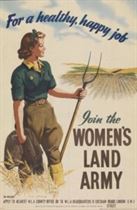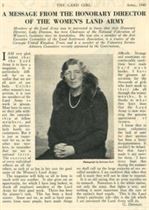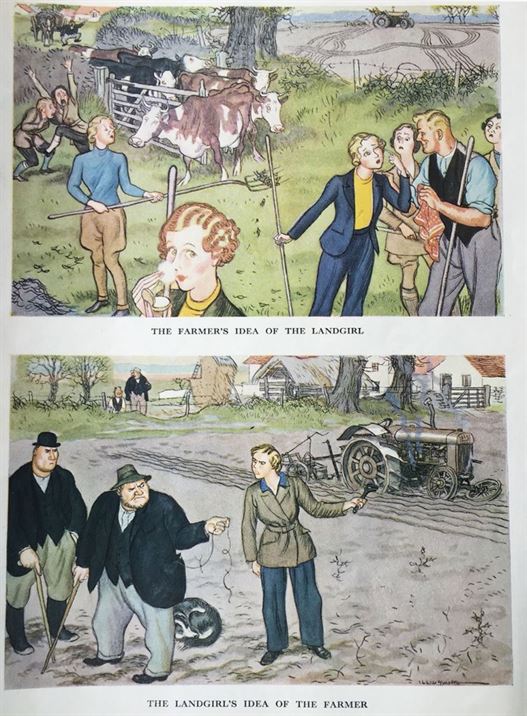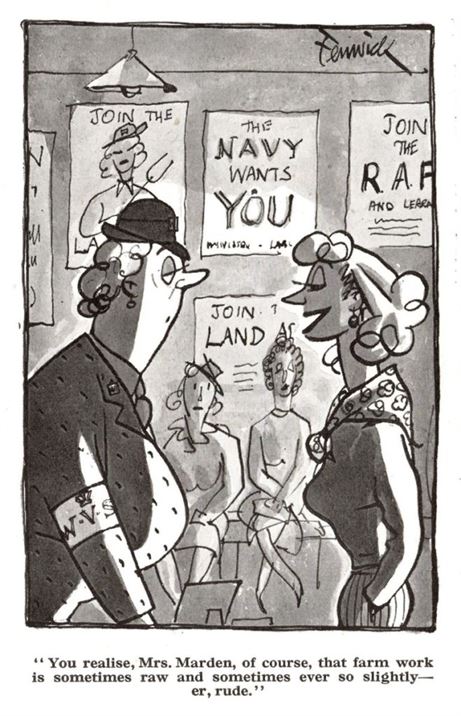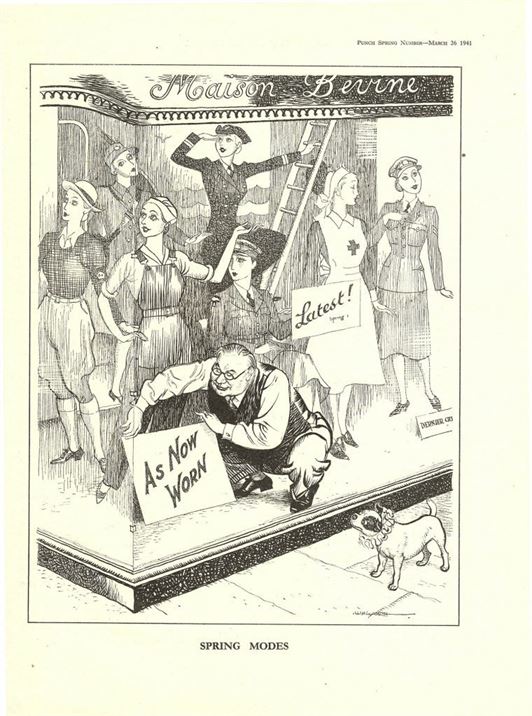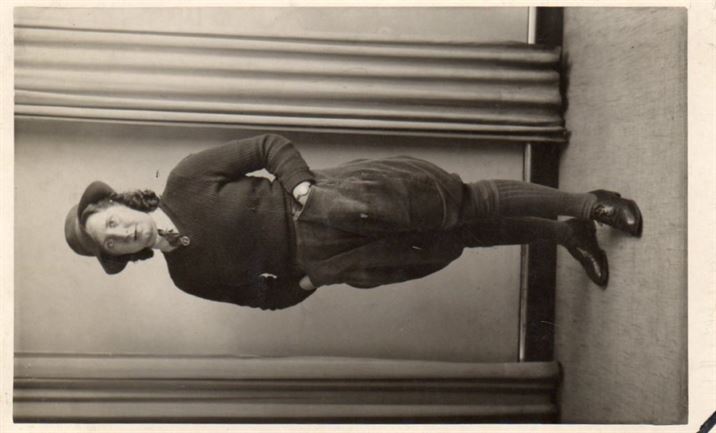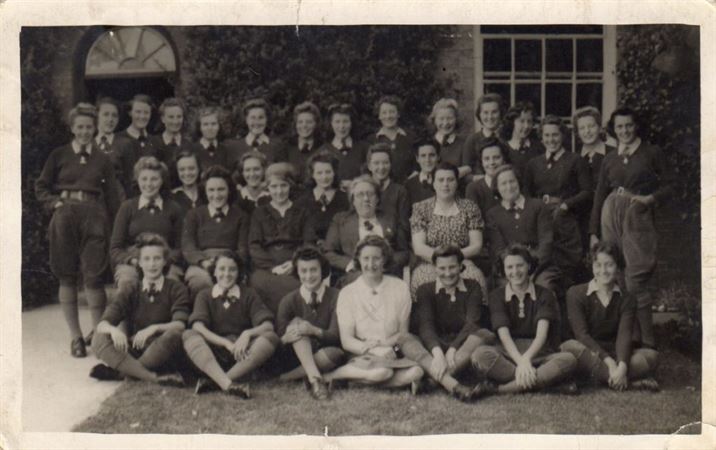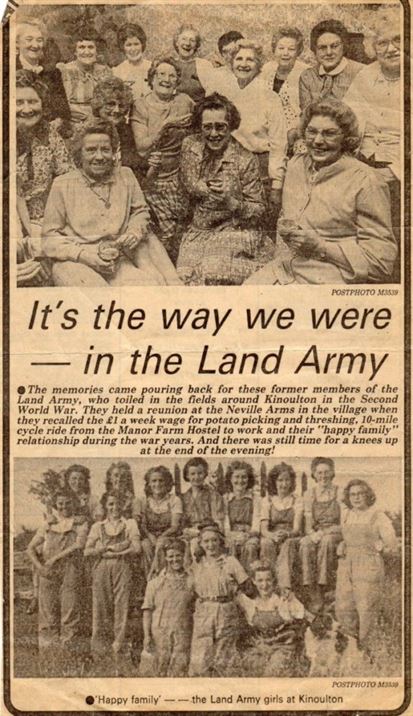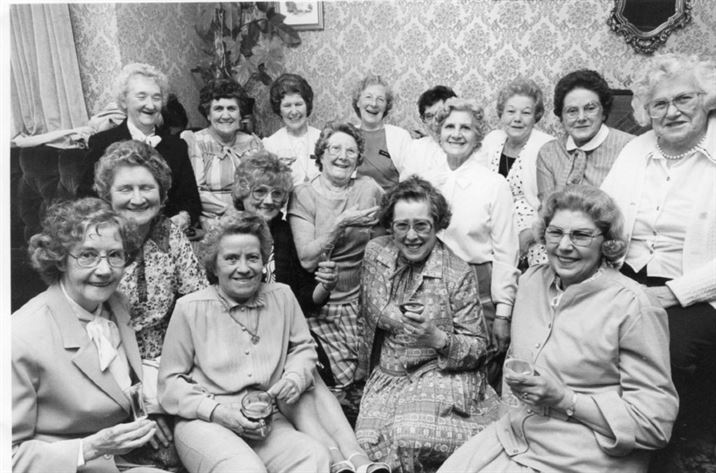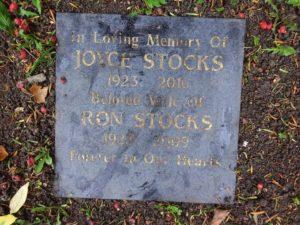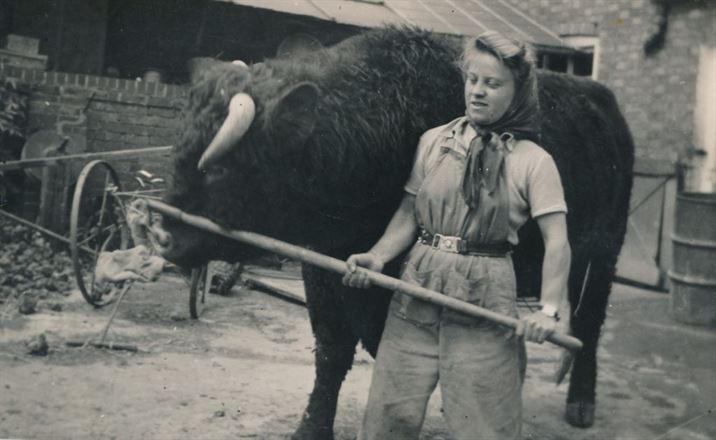
National Archive Office:
“The Women’s Land Army was established in January 1917 to help increase the amount of food grown within Britain. It was wound up in 1919, and then re-established shortly before the outbreak of the Second World War, in June 1939. It was finally disbanded in 1950.
“At its peak in 1943 over 80,000 women worked as ‘land girls’. They came from a wide range of backgrounds including towns and cities as well as the countryside.
“Surviving members of the Women’s Land Army (or spouses or families of members who died after 6 December 2007) can apply for a commemorative badge from the Department for Environment, Food and Rural Affairs acknowledging the debt that the country owes them.”
‘Our women on the land’: Women’s Land Army index cards go online – click here:
Interestingly, the Women’s Land Army and the WI (Women’s Institute) are closely linked through their respective founder: Lady Denman:
“Throughout her time as Director, Lady Denman assumed responsibility for ensuring her young women received a fair wage and health insurance. When in 1945, Land Girls were not to receive the same post-war benefits as women in other civilian occupations, she resigned in protest at the poor treatment of the WLA – the ‘Cinderella Army’. With a long involvement in rural life, Lady Denman was vital to the success of the WLA. Her drive, passion, business-like efficiency and strong character, was critical to maintaining food production and challenging the scepticism expressed towards female farm labourers.”
.
Women’s Land Army in Hickling and Kinoulton
We have very little on the Women’s Land Army in our area – if you can help to add to our information we would love to hear from you.
The Land Girls’ Hostel was at Manor Farm (now The Manor) on Hall Lane in Kinoulton.
A Daughter Remembers:
“My mum came from Carlton, Nottingham and joined the Land Army when she must have been around 18 or 19 and previously worked at the John Player cigarette factory in Nottingham. This must have been quite a shock to the system having lived in the city. She was sent to Kinoulton and was billeted at Hall Lane, Kinoulton. I don’t think she was in the Land Army for long as she met my dad who lived and was working on a farm in Owthorpe. I know they had to get married and had a daughter who unfortunately died aged 7 weeks. They were married for 55 years and lived at Owthorpe until my dad retired. Unlike a friend of mum’s who was in the Land Army with her, who also ‘got in the family way’ and she had to give her baby up when she met a man who wouldn’t accept the baby … I think it must have been terrible for women in the past, the awful stigma of unmarried mothers. My mum never referred to her having to get married but I know that is why my dad was so strict with me and my sister when we were teenagers!
“She never said much about being in the Land Army, although she did make lifelong friends and as you can see in the last photo, they had a reunion at The Neville Arms, Kinoulton. The only other thing I can remember is that she said that some of the farmers were unkind and used to get the girls to do horrible jobs on the farm. It is unfortunate that I didn’t ask more about her time there. In the group photo it is my mum in the middle in a white blouse, I presume she must have left the Land Army at the time the photo was taken.
“I hope that this little bit of information is of some use; I have included the bits about my mum and dad because I think it demonstrates how things were at that time, one can imagine all the young men in the area cycling to Kinoulton to meet the girls. We tend to romanticise the time, but I imagine it was anything but.”
(Maureen Cockayne 2020)
Marjorie Jane Wright.
Marjorie Wright’s son, Paul Miller, contacted us with memories (and memorabilia) of his mother’s time as a land girl in Hickling Pastures and Kinoulton; including photographs and parts of her uniform plus a letter from the Queen and a medal. She was based in the YWCA Hostel in Kinoulton and he has sent us her joining up papers which include travel instructions and details of what she should bring with her. Marjorie was also known as Snow White because of her long black hair.
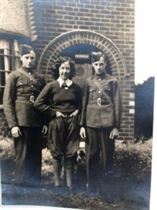
Marjorie often talked about working on farms in and around Hickling Pastures; particularly, she spoke of Mr and Mrs Salt (“who she loved”) and that they had a son, Alwyn.
Photographs include Marjorie in her Land Girl’s uniform standing outside her parents’ house in Nuthall with her twin brothers who were training to be navigators and her wedding photograph from April 1946. At the beginning of the war her husband-to-be gave her a lovely brooch of a spitfire:
“This is about an inch long and about an 1¼” wingspan. It was something my Dad got my Mum before he went to India for 4½ years in the RAF. I always understood that it was made of silver sixpences, though I understand they also made them from silver coins in India.”
“My mum wrote poetry, I have the original, very brown and crinkled notebook she wrote them in. It’s all in her own handwriting, and it’s a treasure. The first thing I want to send you is a poem my mum gave my dad when he went to India for over 4years.” Not unusually, much of Paul’s memorabilia is tucked away and he hopes to add some more photos when he can:


Memories of War-time: John Wilkinson.
“My name is William John Wilkinson, known as John, as Dad was William called Bill. My family lived at Bells Farm Cotgrave just up from the A46. Dad had land girls to help on the farm, it was a mixed farm of about 76 acres – we milked and had hens, pigs also some arable. I remember the bombing of Nottingham at night; Dad was in the Homeguard at night.
I can remember most of the time we lived at Bells Farm, we left in 1948 after 1947 winter when we were cut off for weeks with snow drifts. It must have been harsh for the land girls – no running water or electricity, still using horses for most of the farm work and hand milking. Corn was threshed out of stacks in wintertime with extra help from POWs. We did have hot summers though, so it seemed.
I cannot remember many names only Peggy Kingston from Leicester and Joyce, also one called Ginger. Two of them stayed over when my sister was born in 1942.
I walked to Cotgrave school most days with petrol being rationed, we sometimes cycled over to Aunt and Uncle’s at Fosse Fields Farm, East Bridgford on a Sunday up the Fosse Road now A46. Fair way for a 7 year old and back again after tea.”
Joyce (Bloor) Stocks
We have very little information about Joyce, but it is believed that she came to Hickling as a landgirl during WWII and subsequently married Ron Stocks; their cremated remains are buried in Hickling churchyard.
There is a likely birth record – Winifred Joyce Bloor in July 1923 in Nottingham (mother’s maiden name, Brown). She married Edgar R Stocks in July 1947 (Basford District). Edgar R Stocks was listed in the 1939 Register as a farmhand living in Bilsthorpe; no trace found of Winifred Joyce Bloor in 1939.
If you can add to this history, please contact us.
Peggy Kingston.
(November 2021 – extract from a longer article)
We recently received this response to John Wilkinson’s memories (in the paragraphs above): “I picked up your piece about The Land Army in Hickling, I read it all and then at the end is John Wilkinson talking – he mentions my aunt, Peggy Kingston. I can add some more to that.”
Peggy Kingston’s nephew was able to identify his aunt in two of the photographs that we already have and went on to share wonderful memories of her attachment to this area and her years as a land girl:
“My aunt never stopped dreaming of her life in The Land Army and it was only in the final three years of her life when I moved to Rutland that I was able to spend time with her. We returned numerous times to your village and Cotgrave and I let her talk and talk about it. When she died I went to a field on Kinoulton Hill and scattered her ashes along with I think 5 of her dogs. She was 93 when she died.”
Peggy and her sister (Vera) were born in the Belgrave area of Leicester near to St. Peter’s Church and had an agricultural background on their father’s side – he had also been a cavalryman in WWI. Peggy was born on the 17th March 1915 and, after the war, she married a milkman, becoming Peggy Marson; she had no children but she did have “lots of dogs”. Vera and Peggy were very different in character and whilst Vera worked in an office during the war and took care with her appearance, Peggy’s only thought was to work on the land; “she loved working in a physical, messy way, she was happy digging in and working hard”. After the war she continued her agricultural work on a farm west of Leicester and returning to the Belgrave area in later life she happily embraced the new Indian families settling in the area, attending a neighbour’s Indian wedding and with Indian friends attending Peggy’s funeral just over ten years ago.
Although the land girls were based in the hostel in Kinoulton they worked widely in the surrounding villages; often having to walk many miles to get to and from work and the hostel. Peggy was mostly based on Manor Farm on the road between Kinoulton, Owthorpe and Cotgrave – it is here that John Wilkinson (above) remembers her from. In her later years she often asked to be driven back to the area, to explore her old haunts and to talk over her memories. Manor Farm is no longer there but she spoke of “horses next door” and on one return visit, she met a neighbour selling railway sleepers (on Manor Farm road) and remembered his friendliness and how kind he was to Peggy when they visited.
Peggy’s nephew has a lovely photograph of Peggy sitting on a gate on Kinoulton Hill (it is dated May 1944 and labelled Kinoulton Hill); the gateway has a distinctive angle and he was able to find it when he was searching for the right spot to scatter her ashes – she would “always be in Kinoulton”. He also has 3 armbands from her time in the land army and Peggy’s copy of a wonderful first edition of Vita Sackville-West’s book recording the Women’s Land Army.

